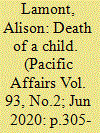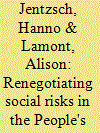|
|
|
Sort Order |
|
|
|
Items / Page
|
|
|
|
|
|
|
| Srl | Item |
| 1 |
ID:
171720


|
|
|
|
|
| Summary/Abstract |
Within the institution of family welfare in the People's Republic of China, the role of the child as future caregiver is so deeply institutionalized as to be almost invisible to policy makers and family members. This article explores institutional responses to the death of a child after the 2008 Wenchuan earthquake to demonstrate how this taken-for-grantedness of the child caregiver role has opened up bereaved parents to social risk, and how actors must perform institutional work to "repair the breach" of the loss of a child in a family. Findings show that after the 2008 Wenchuan earthquake, policy actors took steps to manipulate entrenched family welfare resources, including the population and family planning regulations, to enable bereaved parents to have another child. In so doing, they sought to patch and restore meaning to the family welfare institution, enabling it to continue autopoiesis and resist institutional change in the face of exogenous shock. Use of policy and the positive representation of the policy outcomes in the state-led media enabled sensegiving to be imbued into an otherwise emotionally conflicted decision to try to conceive again soon after the loss of a child.
|
|
|
|
|
|
|
|
|
|
|
|
|
|
|
|
| 2 |
ID:
171714


|
|
|
|
|
| Summary/Abstract |
There have been various attempts to capture the direction of welfare provision in Japan and the People's Republic of China (PRC) as a regionally coherent welfare regime, following on from attempts by the welfare regime literature to categorize nation-states by the characteristics of their welfare provision in the West. However, stark differences between the PRC and Japan as regional neighbours, and even within the regions of each country, pose a challenge to this kind of macro-level theorizing. This special issue seeks to supplement macro perspectives on welfare regimes by exploring a range of welfare policies across both states from an ethnographic, bottom-up perspective, which captures the dynamic nature of welfare and highlights the importance of understanding how local actors request, interpret, and implement risk management strategies. The management of social risks is shown not to have one clear direction determined by, for example, market logic: instead, this special issue highlights the ways in which the burden of risk shifts between family, market, state, and communities unevenly over time, reflecting underlying institutional norms which are always up for negotiation. In doing so, this special issue emphasizes the importance of local, contextualized understandings of welfare, and suggests that the comparative welfare regimes literature should seek the micro-institutional foundations of welfare provision as the basis for comparison.
|
|
|
|
|
|
|
|
|
|
|
|
|
|
|
|
|
|
|
|
|